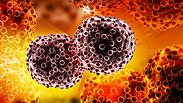
Ashkenazi Jews are 4 times more likely to have cancer
A study released by The Ministry of Health reveals that ethnicity and place of residence factor into the cancer incidence ratio, and that Israeli descendants of Ashkenazi Jews are more prone to cancer than Israeli-born children who are descendants of Sephardic Jews.
To the growing causes of cancer, which include smoking, sun exposure and radiation, it seems likely that ethnicity is going to have to be added to the list as the Ministry of Health data showing that Ashkenazi Jews are 4 times more likely to have cancer than Sephardic Jews.
The data also noted that residents of the periphery are more likely to have cancer than those residing in the center of Israel. In comparison with the rest of the world, the cancer rate in Israel is higher than the average in OECD countries.
The large gap persists even when examining the morbidity rate for different types of cancer. For example, breast cancer cases among Ashkenazi Jews stands on 18 cases per 100,000 individuals, versus 4 cases among Sephardic Jews.
Ashkenazi Jews may be more likely to fall sick than Sephardic Jews, but the Ministry of Health data also reveals that the highest rate of cancer cases in the past few years is actually among Israeli Arabs and Israeli-born Jews.
For both populations, the number of cancer cases has doubled in the last 20 years. In comparison, the caner rate among Ashkenazi Jews has dropped by 30 percent during the same period.
The impact of ethnicity on cancer incidence is consistent with the data released by the Centers for Disease Control and Prevention in the US, which uncovered significant gaps in the number of cancer cases within the different ethnicities and races in the US.
In recent years, following the development of technology and whole genome mapping, researchers now understand that even though cancer is usually not hereditary, its source is genetic. In other words, unlike hereditary genomic alterations, there are changes in the genetic material occurring in the tumor cells only as part of the malignant process, such as different mutations and changes in the genetic sequence.
The implication would be that Israeli-born children, who are the descendants of Ashkenazi Jews, are more prone to cancer than Israeli-born children who are descendants of Sephardic Jews.
Mapping out cancer's genetic variety serves as the new front in the war against cancer as part of Personalized Medicine. Genetic testing can already be conducted once the disease is diagnosed, followed by genomic mapping of the patient's specific type of cancer.
The first biotechnology company that made whole genome mapping available to cancer patients and their treating oncologists was the Foundation Medicine company that utilizes the extensive experience accumulated to identify new and rare mutations, which would then enable personalized care.
The genetic tests help physicians choose the most efficient treatment out of all available options against the specific type of cancer identified by the test, and adjust it to the patient, or reinforce the need for the standard of care.
"If what is known today were applied," stated Miri Ziv, Director General of the Israel Cancer Association, "we could reduce the cancer incidence and morbidity rates by 50 percent. Behind the encouraging numbers lies the concentrated effort of the Israel Cancer Association that initiated and pushed forward prevention programs, early diagnosis, as well as improvement of care and rehabilitation."











